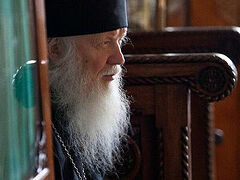One year ago, the Holy Trinity-St. Sergius Lavra and a multitude of spiritual children from Moscow and other Russian cities parted with Archimandrite German (Chesnokov), who for forty years bore the extremely difficult podvig of exorcizing evil spirits. Batiushka departed to the Lord right on the eve of his patron saint—something worthy of ascetics and the righteous. Igumen Philaret (Tambovsky), who serves in the Church of the Mother of God “Joy of All Who Sorrow” on Bolshoy Ordinka Street in Moscow, reminisces about the newly reposed Fr. German.
 Archimandrite German (Chesnokov)
Archimandrite German (Chesnokov)
The enemy is sowing confusion, but Fr. German pulled lives out of that maelstrom.
I knew Fr. German since 1982—it was about that time when the spiritual council of the Holy Trinity-St. Sergius Lavra blessed him to serve the “Rite of casting evil spirits out of people”—the so-called “exorcism of demoniacs”. My grandma Martha’s sister was his spiritual daughter. Fr. German often stayed with her when he came to Moscow. He would live there for a few days, receive people there, baptize, confess, serve Unction, and even perform exorcisms right in her home.
I also remember his parents; they would also stay with my grandmother when they would come from the Kuban1 to visit their son the monk. They would travel all over Moscow to venerate the holy shrines. They were deeply religious people, and very modest.
Fr. German baptized many high-ranking party members. They would often come to him with their children’s problems. I remember that he would always instruct them: “You need to be married in church.” But now the devil is bringing such confusion that children are affected even in church-wedded families, even in priests’ families.
I remember one priest who came to Fr. German—his son had graduated from seminary, and someone advised him to receive another secular education. Nowadays you’ll hear people talking about pursuing a psychological education, for example, after seminary. Well, in the secular college the boy was morally ruined. Some girl there charmed him and he simply lost his head, married her, and as it turns out her mother was a sorceress—a practicing one, crystal ball and everything… So under such an influence, everything was a mess in that young family; a very sick little girl was born, who lived to age six and then died. When this priest’s son had finally drunk his fill of all this he made his way to Fr. German, who told him right off:
“You won’t have a life with her, she’s following in her mother’s footsteps.”
Later, after the young man had become a monk in one of the monasteries of the far north, Fr. German told him, “If you had stayed there with your wife and mother-in-law, you wouldn’t be alive today.” That young man repented deeply.
Everyone and everything had a place with him
In the Lavra Fr. German lived under the stairway of the Forerunner building. His cell was small and unassuming—a way station, like that of a true monk. Batiushka Kirill (Pavlov),2 who was my father-confessor, would say, “Don’t go from cell to cell.” But when Fr. German needed help with something, Fr. Kirill would bless me to go: “Help, help, help,” he would say.
Sometimes I would bring them oranges that I received from my grandmother, who worked as a cleaning lady in “Zagrantorg” [“Foreign trade”]. Oranges were a rare commodity at the time.
“Martha the vitamin lady,” Fr. German would joke. He would thank her right away, saying, “She takes care of my health.”
But he would assiduously note that “we have to dry the peels—they keep away the moths.”
This is the monastic approach—very frugal in everything that God sends him. Even the peels have to be saved and put to use.
I remember once we came to the Lavra, and there were crowds of people. We entered the Dormition Cathedral through the side door of the narthex. Fr. German had a very good voice; he often sang on the cliros then, and directed the choir. There were choirs of ten people then. I looked, and he was rushing somewhere—he was always so quick, like an angel, and suddenly his klobuk3 was in my hands… I stood there absolutely stunned.
 Archimandrite German (Chesnokov) at Archimandrite Kirill’s (Pavlov’s) funeral. The elders are departing.
Archimandrite German (Chesnokov) at Archimandrite Kirill’s (Pavlov’s) funeral. The elders are departing.
Fr. Kirill was walking by.
“Who entrusted that to you?” He said. I was only ten years old and the time.
“Fr. German gave it to me to hold.”
“Oh, Fr. German. He doesn’t give things without some reason,” and he walked on.
Fr. German was gone for a long time, and then he returned. “Oh! Did I give that to you?”
“Yes, Batiushka.”
“Well, alright,” he looked at me gaily. Let it be as God arranges, but probably you’ll be a monk.
I had no thought of such a thing at the time, but that is what happened as the years went by.
<…>
Required of you is self-sacrificing service, or what made Fr. German happy
The enemy of mankind instigated slander against Fr. German for his zealous service of God and people. Some “reports” were sent about him to the Patriarchate. His Holiness Patriarch Alexei II came to the Lavra soon after his enthronement and requested that Fr. German come to him.
“Continue your podvig that you bear at the blessing of Patriarch Pimen. Do just as you have been doing. Don’t pay any attention to anyone’s claims.”
Fr. German never hid anything from anyone; he always performed the exorcisms openly—these things should not be surrounded by fanfare but neither is secretiveness in order. Fr. German told His Holiness all about his practice, and showed him the Rite that he used in the exorcism of evil spirits.
There were also various accusations against batiushka concerning money. But in that regard, he was transparent as crystal. He never kept anything for his exorcisms. The abbot, Vladyka Theognost, always said of him, “Fr. German is unmercinary.”
I remember that once Fr. German was asked about life in the Lavra, and he replied, “There is one condition there—you have to have a strong love for St. Sergius.” Only self-sacrificing service is required of you. Some live for themselves, but Fr. German lived for God, for St. Sergius and his Lavra. He also restored three churches in the vicinity, and helped everyone.
Fr. German himself just waved his hand at all such discussion and said, “Let them talk. You can’t tie a handkerchief around another person’s mouth. They’re taking my sins away from me! I am a sinful man, I do this work, receive so many sick people, but I myself am covered with infirmities. And here they take my sins away from me. I’m very glad of it.”
“Let’s not despond, let’s correct ourselves!”
I remember, once I came to the Lavra and Fr. German was still in the St. John the Forerunner gate church, serving the rite of exorcism (later after 2014 they blessed him to serve exorcisms in the Church of Sts. Peter and Paul, due to his health).
“Help me out,” he said.
I was shy. “Batiushka, how can I help?”
“Well, you can hand me the water…” He could see my confusion and squinting his kind eyes, probed, “Are you afraid?”
“No, Batiushka, I’m not afraid,” I perked up. “Why should I be afraid? I’m with you.”
Then he signed me with the cross, showing that the most important thing is that we are with God.
Fr. German was a preacher of repentance. Unfortunately, people have begun to loose the spirit of repentance. Then, as we know, sorrows can come in—both personal and collective, if repentance is cut off.
By the way, it was very easy to confess to Fr. German. Even the most hardened sinners felt at ease in his presence.
“Well, let’s not be despondent,” he would encourage people. “Let’s correct ourselves! And I’m the first of you needing correction.”
Everyone would respond, “Batiushka, pray for us!”
But he would uphold his holy simplicity, sighing as if to say, “If only there were someone to pray for me”.
“Mama, pull the tail out of my mouth!” An incident at an exorcism
I saw a fair amount at the exorcisms. One little boy was screaming terribly. He ripped away all his clothes and was rolling naked on the floor. His mother threw her mohair shawl around him, but he just kept shouting and writhing:
“Mama, mama! Pull the tail out of my mouth! Pull the tail out of my mouth! Mama! Oh! I have a mouth full of hair. Pull the tail out of my mouth! Pull out the tail!”
She said to him, “Son, there’s nothing there…”
“Pull out the tail!”
He was wearing himself out. He out-screamed everyone there.
Batiushka made the rounds to everyone, and sprinkled him with holy water also. The boy as if went silent. Then he started over again. I thought he’d tear his vocal cords—a child can’t go on screaming for so long. Batiushka returned to him; he left everyone else this time. Then it became clear—and this is the usual cause of demonic possession in children—his mother had not repented of her abortions.
Afterwards, I asked batiushka about this boy.
“He’s suffering for his parent’s sins,” he replied. True, this time he stopped, looked in front of himself, and added, “Perhaps for something else as well. Sometimes priests shorten the Sacrament when they baptize, and don’t read all the prayers. This is a very serious thing. There is only one case when a baptism can be rushed—when there is fear of imminent death.”
Fr. German was also against the shortening of the Sacrament of Unction, or any services for that matter. He was against all kinds of novelties. “Modernists do not know what they’re doing,” he noted, “and how people later have to suffer for it…”
But then, Batiushka took the holy water sprinkling brush and walked up to the boy. He sprinkled him. The boy quieted down. Then Batiushka made the sign of the cross over him with his blessing cross. Afterwards, he anointed him. He’d surely forgotten about everyone else. All were standing there praying; no idle talk, only “Theotokos and Virgin rejoice” or the Jesus prayer. Thus Batiushka anointed him with holy oil, and poured holy water right into his mouth—moreover the boy didn’t even swallow; it as if poured into him in an uninterrupted stream.
“More! More!” the boy was asking Batiushka himself for holy water when Fr. German paused. Incidentally now he was speaking with a boy’s voice, while before he was as if throwing out phrases in some alien, base voice. But now came the tiny voice of a little boy: “More, more, more…”
Batiushka said, “Let’s go, come on” as he poured the holy water straight into him.
He spent about a half an hour with him. The boy was soaking wet—even before the holy water he was wet with sweat from flailing and shouting. Now a calm set in.
 In the St. Serapion tabernacle of the Lavra, before the Friday Paraclisis to the Mother of God. Batiushka said to the mother, “Lift him up.” The boy looked about six years old. “Now they’ll bring a large towel,” and just then they brought one and wiped him down. The boy fell asleep; they wrapped him in the towel, put on his socks, and the mother spread her mohair shawl over him.
In the St. Serapion tabernacle of the Lavra, before the Friday Paraclisis to the Mother of God. Batiushka said to the mother, “Lift him up.” The boy looked about six years old. “Now they’ll bring a large towel,” and just then they brought one and wiped him down. The boy fell asleep; they wrapped him in the towel, put on his socks, and the mother spread her mohair shawl over him.
“Put him over there,” Batiushka said, pointing at the bench by the window.
“You have to bring forth repentance. Understand that this did not happen by itself. And I’m not a wizard. Did you hear my sermon?” Batiushka in his sermons would explain the fundamentals of spiritual life, clarify passages in the Gospel, why people suffer for their sins, get sick, and condemn their own children to suffering…
“I heard it.”
“You weren’t wearing crosses. They gave you crosses here.”
“Oh, Batiushka, I’ll wear it!”
“It’s not enough just to wear it. You have to repent.”
But the enemy as if held her back and wouldn’t let her go. Near Batiushka this would become visible.
“I’m ashamed. I can’t say it,” she said, making excuses.
“But are you ashamed before God? Do you want to lose your child?”
This mother and child came again to the exorcisms—three days in a row. She received Unction. In the end Batiushka did hear her confession and blessed her to receive Communion, once. But he blessed the boy to receive Communion three days in a row, every day. And finally the boy received Communion normally, without flailing or tearing away.
Fr. German said to the mother afterwards, “If you wear trousers you’ll get sick. A woman should not wear pants. Don’t make excuses, saying that there are also women’s trousers. No self-justification.”
The following days she came wearing a dress. There you have it—people change through both external and internal awareness. Batiushka instructed her to come back to him in a year, then blessed her to go, with the warning: “You have a church where you live.” They were from somewhere in the south, maybe even from Batiushka’s native Kuban. “Make sure you receive Communion once a month without fail. With deep repentance. But take him to Communion every day,” he said, looking at the boy. “Both of you must keep the Wednesday and Friday fasts, and you must fast on Mondays also.”
Fr. Kirill (Pavlov) also blessed people to do this, as did Fr. German. He blessed mothers to fast on Mondays for the sake of their children—especially those who have problem children. “This is an inalienable condition,” Fr. German would enjoin mothers who really care for their children.
Fr. German saw this mother and her boy a year later. They even brouht the father this time. Batiushka would also talk with such couples about receiving the marriage Sacrament, however this couple was married in church even before their son became demonically possessed, but only because it was the fashion and not out of any particular religiosity. Later they began going to church and leading a more religious life. The boy was now normal, although I could see in all their eyes what a horror they had been through. That remained. But the boy looked wonderful—bright and hale.
He couldn’t pass anyone by. His love knew no bounds
Fr. German had enormous love for everyone and prayed for all. He never judged anyone, and forbade others to speak badly of people. He would always change the subject of a conversation if something like that would come up.
His love knew no bounds. He couldn’t pass anyone by. He welcomed all, fed them and gave them to drink, and helped them in every way—some with prayer, others materially, such as helping them buy an apartment or get a mortgage. He would always gives alms if he saw someone in need.
“Batiushka, what are you giving him money for? He’s only going to use it for drink!” someone objected once, walking after the almsgiver.
“Maybe vodka is his only consolation,” Fr. German said, turning around. “What can be done? He lives on the street. Just try living on the street. You come home—you have a warm bath, a refrigerator full of food; you eat your fill, wash up, lay down in a warm bed, and turn on the television (Fr. German grieved that those “thousand-series films are created for the destruction of souls”), but he’s out in the streets… How long a life has the Lord given him there… People don’t sit on the street with outstretched hands for no reason… God forbid. How can I not give him something?”
Batiushka always exhorted those who judge:
“Watch after yourself. Be vigilant and watch yourself—your own behavior, words, and thoughts. And repent more often. If you don’t have an opportunity to bring repentance to church right away, stand at home before the Savior and repent. Every day. And when you’ve sinned, repent before the Lord immediately. At the end of the day at your evening prayers, don’t just read the prayer book but repent with compunction.
Batiushka German was a spiritual man. He helped many people. He was all things to all people, that he might save at least some (cf. 1 Cor. 9:22). Keeping St. Sergius’s commandment, he never let anyone leave unconsoled. He simply considered that he had no right to not show love—and this applies to all of us, if we are Christians.



